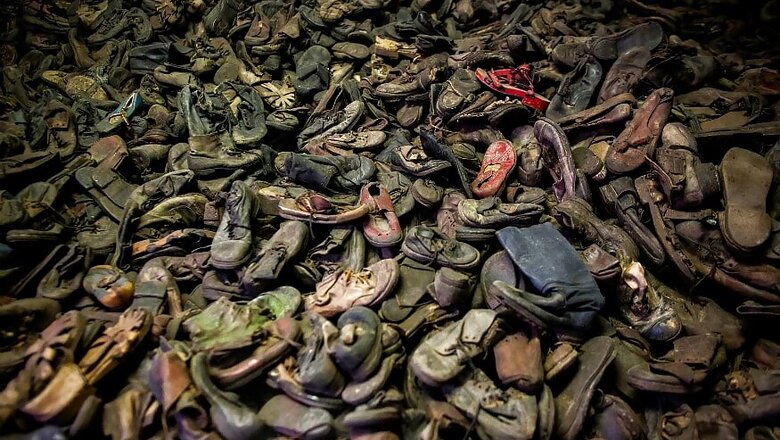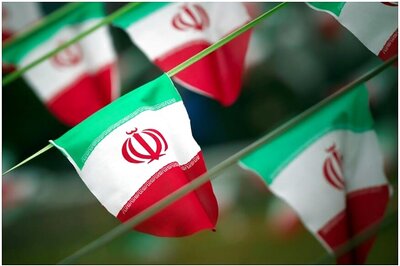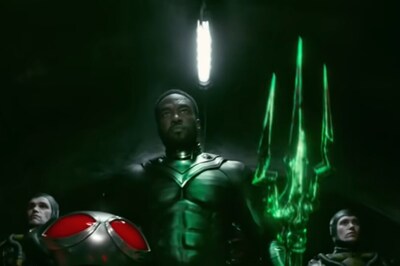
views
Auschwitz-Birkenau (Poland): Even before the gas chambers were destroyed and the savage toll of years of industrialized mass murder revealed to the world, prisoners at the largest Nazi concentration camp were already repeating two words: Never again.
But as the 75th anniversary of the liberation of Auschwitz approaches, an occasion being marked by events around the world and culminating in a solemn ceremony at the former death camp on Monday that will include dozens of aging Holocaust survivors, Piotr Cywinski, director of the Auschwitz-Birkenau State Museum, is worried.
“More and more we seem to be having trouble connecting our historical knowledge with our moral choices today,” he said. “I can imagine a society that understands history very well but does not draw any conclusion from this knowledge.”
In this current political moment, he added, that can be dangerous. All one has to do is look at the backdrop against which this anniversary is taking place.
Across Europe and in the United States, there is concern about a resurgence of anti-Semitism. Toxic political rhetoric and attacks directed at groups of peoples — using language to dehumanize them — that were once considered taboo have become common across the world’s democracies.
And as the living memory of World War II and the Holocaust fades, the institutions created to guard against a repeat of such bloody conflicts, and such barbarism, are under increasing strain. With the very notion of the truth and facts under assault in increasingly polarized societies, control over the historical narrative is yet another battlefield.
Even the memory of Auschwitz — where 1.1 million men, women and children, mostly Jews, were murdered — has been weaponized.
As world leaders converged on Israel this past week for a ceremony at Yad Vashem, the hillside Holocaust memorial in Jerusalem, the event was clouded by a bitter dispute between Poland and Russia. After President Vladimir Putin of Russia was offered a speaking role, the president of Poland, Andrzej Duda, pulled out when he was not granted the same privilege.
“Unfortunately, I am sorry to say this, but President Putin consciously, certainly, spreads historical lies and obviously does it with an agenda because he is trying in this way to erase the responsibility of Stalinist Russia for the start of World War II together with Nazi Germany,” Duda told Israeli state television. “I imagine he is ashamed of it today.”
But far from expressing shame, Putin and his government have been increasingly aggressive in their efforts to whitewash the historical record concerning the Soviet-German nonaggression pact of 1939 and the subsequent invasion and subjugation of Poland.
“It was them who, while pursuing their mercenary and exorbitantly overgrown ambitions, laid their people, the Polish people, open to attack from Germany’s military machine and, moreover, generally contributed to the beginning of the Second World War,” Putin has asserted.
While Poland is a deeply divided country when it comes to politics and culture, the outrage over Putin’s remarks is nearly universal in the country, as is the support for Duda’s decision to boycott the event at Yad Vashem.
“It’s surreal that a global event dedicated to the memory of the Holocaust victims becomes a political affair, a cover for history trading,” said Shevah Weiss, an Israeli political scientist and former president of Yad Vashem. Born in Poland in 1935, he is a Holocaust survivor and served as an Israeli ambassador to Poland. “The Polish president was right to refuse to attend it,” he added.
But the current Polish government’s stance is complicated by its own efforts to shape history to promote its own brand of aggrieved nationalism.
After the government passed a law that would have made it a crime to accuse Poland of complicity in the Holocaust, which critics said could stifle free speech, the international backlash was swift. Poland ended up backing down but not before undermining years of hard work to build better relations with Israel. It also brought a strong rebuke from American lawmakers, usually steadfast allies.
Pawel Spiewak, the director of the Jewish Historical Institute in Warsaw, said it was all very sad. So many people were “touched by hell” during the war, he said, but instead of finding common ground, political leaders stoke division and risk repeating the mistakes of the past.
“The language and system of values of the new Europe that emerged after the Second World War are being forgotten,” he said. “People don’t want to listen to it. I would say they are even tired of it.”
That makes for a public more susceptible to false and distorted narratives. Which is why Auschwitz itself remains so important: Unlike many of the concentration camps, where a total of 6 million Jews were killed over the course of the war, Auschwitz largely escaped destruction.
Last year, more than 2 million visitors crossed under the same wrought iron gateway as tens of thousands of prisoners once did, looking up at the cruelly ironic words “Arbeit Macht Frei,” or “work sets you free.” For most during the war, freedom would never come.
While the two main gas chambers were blown up by the Nazis before they fled, the ruins still testify to their existence. Visitors can see the ovens used to incinerate the remains of those slaughtered. The train tracks leading into Birkenau, where cattle cars would arrive crammed with Jews who were swiftly herded into the gas chambers, are no longer used but remain a ghastly reminder of the scale, reach and industrialization of the murder apparatus.
Ronald S. Lauder, the cosmetics billionaire and philanthropist, has made it his mission to help preserve the site, helping to raise $110 million to that end. He said that while historians can speak to events, there was simply no substitute for hearing the stories of real people in a real place made of real brick and mortar.
And this anniversary was special, he said, simply because with the passage of time, there are fewer witnesses left to tell their story. “Almost half the survivors have died in the last five years,” he said in an interview. “This will be the last time we get people together.”
Zofia Posmysz, a 96-year-old Polish survivor of Auschwitz, will not be able to attend the ceremony but said that she had followed the recent political dispute. Listening to Putin’s attacks on Poland, she said, “takes me back immediately and keeps me awake at night.”
“I fear that over time, it will become easier to distort history,” she said in her apartment in Warsaw. “I cannot say it will never happen again, because when you look at some leaders of today, those dangerous ambitions, pride and sense of being better than others are still at play. Who knows where they can lead.”
Marc Santora c.2020 The New York Times Company




















Comments
0 comment